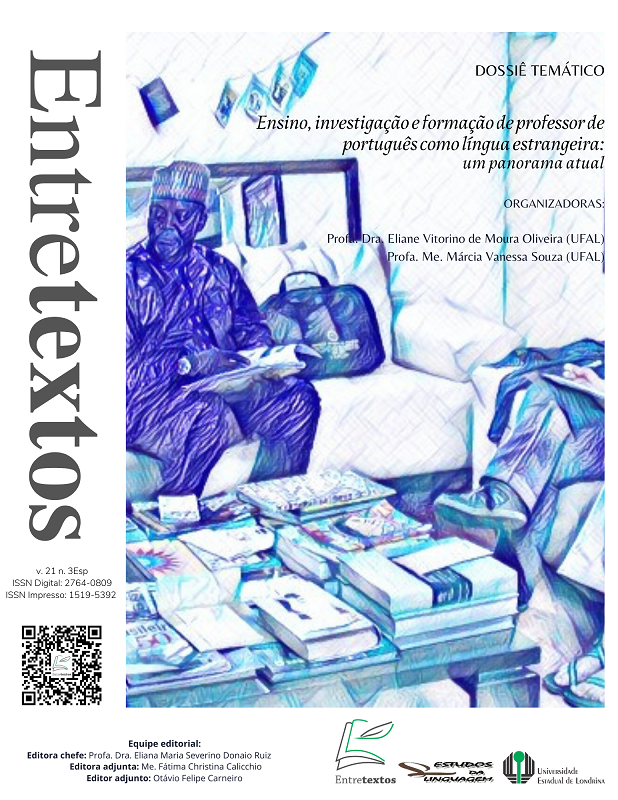Building knowledge and sharing experiences in Brazilian Portuguese as a Foreign Language
DOI:
https://doi.org/10.5433/1519-5392.2021v21n3Esp.p47Keywords:
Brazilian Portuguese as Foreign Language, Teaching and Research, Teachers EducationAbstract
In this paper, we intend to share the path of systematization and execution of a remote course in Brazilian Portuguese as a Foreign Language (PBLE), which we taught in the second half of 2020. The offer of this course is limited to a set of actions in the internationalization process of the State University of Santa Cruz. The PBLE course, therefore, emerges as an action that enables the development of teaching, learning, and strategies for the Brazilian language in the international linguistic scenario (MOITA LOPES, 2016). In this context of internationalization and also as a result of some concerns that emerged throughout the course, especially about the necessity to revise the homogeneous ideal of the national language in a decolonial perspective, taking into account the political-linguistic constitution of Amefricanity and "Pretuguês" (GONZALEZ, 2020), we aim to discuss approaches and methodologies for teaching PBLE, as well as reflect on the process of teacher education and research in this area. With this experience, we found that teacher education and teaching of PBLE must consider the commonplace and everyday specificities of linguistic life in Brazil, taking into account the black and indigenous contributions in the formation of the Brazilian vernacular.
Downloads
References
ALMEIDA, Silvio Luiz. Racismo Estrutural. São Paulo: Editora Jandaíra, 2020.
BAKHTIN, Mikhail. Marxismo e filosofia da linguagem. São Paulo: Hucitec, 1997.
BORGES, Elaine Ferreira do Vale. Comunicativo e comunicacional no ensino de línguas. Linguagens e Diálogos, Rio de Janeiro, v. 3, n. 1, p. 29-42, 2012.
FERREIRA, Aparecida de Jesus. Teoria racial crítica e o letramento racial crítico: narrativas e contranarrativas de identidade racial de professores de línguas. Revista da ABPN, Guarulhos, v. 6, n. 14, p. 236-263, out. 2014.
GONZALEZ, Lélia. A categoria político-cultural de amefricanidade/Cultura, etnicidade e trabalho. In: RIOS, Flávia;
LIMA, Márcia (org.). Por um feminismo afro-latino-americano: ensaios e intervenções. Rio de Janeiro: Zahar, 2020.
MOITA LOPES, Luiz Paulo da. Da aplicação de linguística à linguística aplicada indisciplinar. In: ROCA, Pilar; PEREIRA, Regina Celi. (org.). Linguística aplicada: um caminho com diferentes acessos. São Paulo: Contexto, 2016.
MUNANGA, Kabengele. Negritude: usos e sentidos. Belo Horizonte: Autêntica Editora, 2020.
NASCIMENTO, Gabriel. Raça e resistência ao racismo em atividades de língua inglesa no sul da Bahia. Cadernos de Pesquisa. São Paulo, v. 49, n. 173, p. 208-225, jul./set. 2019. Disponível em: https://www.scielo.br/j/cp/a/NJG4N6vWRLrs3zy4cnzYmBR/?format=pdf&lang=pt. Acesso em: 16 dez. 2021.
ZOPPI-FONTANA, Mónica Graciela; DINIZ, Leandro Rodrigues Alves. Declinando a língua pelas injunções do mercado: institucionalização do português língua estrangeira (PLE). Estudos Lingüísticos, São Paulo, v. 37, n. 3, p. 89-119, set./dez. 2008.
Downloads
Published
How to Cite
Issue
Section
License
Copyright (c) 2021 Entretextos

This work is licensed under a Creative Commons Attribution 4.0 International License.
Entretextos adota a Licença Creative Commons Attribution 4.0 International, portanto, os direitos autorais relativos aos artigos publicados são do/s autor/es.
Sob essa licença é possível: Compartilhar - copiar e redistribuir o material em qualquer suporte ou formato. Adaptar - remixar, transformar, e criar a partir do material, atribuindo o devido crédito e prover um link para a licença e indicar se mudanças foram feitas.























